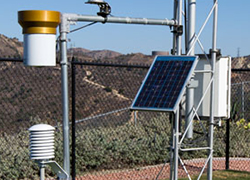Weather Center - ET Zones
ET Hotline
English 949-453-5451
Spanish 949-453-5452
Coastal, Central and Foothill weather station data is electronically transmitted daily to IRWD where it is used in a formula to calculate evapotranspiration, also known as ET, which is the amount of water needed by turfgrass to remain healthy in each specific climate zone.
Outdoor watering accounts for 40%-70% of water used in Orange County. With thousands of acres of valuable community parks, gardens and greenbelts within its boundaries, IRWD's billing system relies on accurate weather station data to provide landscape, commercial and residential customers with site-specific budgets to ensure that your landscaping receives sufficient water.
Reports
*Weekly ET data should be up to date by Monday at 10:30 a.m. PT.
Experiencing technical issues with links above? Please call ET hotline (949-453-5451 for English and 949-453-5452 for Spanish) for potable and recycled water weekly budgets.
Historical ET data
 How weather determines your water budget
How weather determines your water budget
When the weather is hot or windy, your budget goes up automatically. When it's cool or rainy, your budget decreases. It's important to adjust your irrigation based on the season.
The goal is to allow you the correct water budget you need for your landscape to stay healthy and attractive. Using more water than plants need is a waste of water, a waste of your money, leads to unhealthy plants, and can contribute to pollution-causing urban runoff.
To learn more about your water bill and how your water budget is calculated, go to IRWD.com/rates-charges.
Weather station technology helps you save water
IRWD uses the most advanced weather station technology, consisting of Campbell Scientific CR-10X Data Logger equipment, the same used by the California Department of Water Resources for the 100 California Irrigation Management Information System stations around the state.
IRWD's three microclimates
Within our service area, there are three distinct microclimates, known as the Coastal, Central and Foothill zones. IRWD maintains a separate weather station in each climate zone to monitor exact wind and weather conditions, including air temperatures, relative humidity, precipitation, solar radiation, and wind direction and speed.



 How weather determines your water budget
How weather determines your water budget